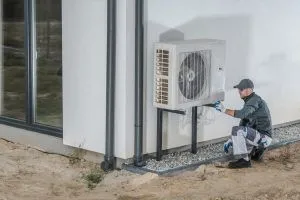
Heat pumps are an all-in-one type of HVAC unit that can keep your house warm in the winter and cool in the summer. To effectively control your home’s indoor air temperature, heat pumps use Freon. Freon is a catch-all term for several different types of heat pump refrigerants.
At Ambient Edge, our team strives to arm homeowners with the information they need to keep their HVAC units in great condition throughout the year. That’s why we’ve decided to offer some helpful facts about the compound your heat pump uses to keep your home comfortable.
Types of Freon Used by Heat Pumps
There are three main types of Freon that have been used in heat pumps. While one form of Freon has been phased out in the United States, learning about the other two can help you understand what your heat pump needs to work properly. The three main types of Freon include:
R12
R12 is a type of refrigerant known as chlorofluorocarbon. R12, along with a number of other chlorofluorocarbons, was phased out in 1994 after it was found to contribute to the greenhouse gas effect and climate change.
R22
After the discontinuation of R12, R22, another type of refrigerant, was used widely in air conditioners and heat pumps across the nation. Unfortunately, R22 was phased out in 2020, as it was found to cause harm to the environment.
While the Clean Air Act Amendments have made it illegal to import or manufacture R22 in the U.S., your heat pump or AC unit may still contain this type of Freon. Don’t worry! You’re not breaking the law by using an HVAC unit that runs on R22.
While it’s not illegal to use a unit with R22, you’ll probably have a hard time trying to find this type of refrigerant the next time you need to replenish your heat pump’s Freon. We’ll go over how to switch your heat pump from R22 to a safer form of Freon in a moment.
R410A
The newest refrigerant blend is known as R410A or Puron. Puron is formulated to have less of a negative effect on the environment while still serving its intended purpose. Puron heat pumps are more efficient and reliable than their R22 predecessors.
Can You Switch Your Heat Pump From R22 Freon to R410A Puron?
Switching your heat pump from R22 Freon to R410A Puron is possible, but it’s not as simple as you’d think. Unfortunately, switching over isn’t as easy as simply replacing the old refrigerant with Puron. To completely switch refrigerants, you’ll have to convert your entire heat pump system.
To convert your heat pump, you’ll need to invest in a replacement condenser, evaporator, compressor, and refrigerant tubing. All of these replacements must be designed to use with R410A. Once you’ve installed all of these upgraded parts, you’ll be able to run your heat pump on Puron.
While it’s possible to convert your heat pump to be compatible with Puron, installing a brand-new heat pump will probably be more cost-effective. Contact your local HVAC service to install a new heat pump that works with Puron. They’ll be able to recommend and install a unit that works for your home and budget.
Benefits of Heat Pumps That Use Puron
While heat pumps that use Freon can get the job done, you’ll need to upgrade to Puron sooner or later. When you do, you can expect to enjoy a number of benefits. Here are some of the advantages you’ll see once you’ve installed your new Puron-compatible heat pump:
- Energy savings: Heating and cooling units that use Puron work well under high pressure and use less energy than heat pumps that use Freon. That means you’ll save money on your monthly utility bill.
- Longer-lasting compressor: Puron cooling units use an enhanced blend of oil to lubricate the compressor. The oil they use allows the unit to run more efficiently and reduces the amount of stress put on the compressor.
- Less risk of overheating: Since Puron absorbs and releases heat more effectively than its predecessor, R410A heat pumps can run cooler and, consequently, are less likely to overheat and fail.
- Environmentally friendly: HVAC units that use Puron are much more efficient than those that use Freon. That means they’ll consume less energy and reduce your impact on the planet. As mentioned earlier, Puron is also designed to have a lower environmental impact. Switching to a Puron heat pump can help you rest assured that you’re doing your part to help save the planet.
Signs That Your Heat Pump Is Low on Freon or Puron
Whether your heat pump uses Freon or Puron, it needs refrigerant to keep your home’s indoor air temperature well regulated. If your heat pump is low on refrigerant, you’ll need to replenish it soon to ensure you have the heating and cooling capability you need to stay comfortable in extreme temperatures.
You probably need to refill your heat pumps refrigerant if you notice any of the following warning signs:
- Refrigerant leak at one of your heat pump’s connector points
- Frozen evaporator coil
- Poor heat pump performance
- Higher energy bills
- Liquid pooling near your heat pump
- Gurgling sounds coming from your unit
If you notice any of the warning signs mentioned above, you should consider getting your heat pump checked for a leak. Your local HVAC service can pay you a visit and determine whether your unit is leaking or not. If they find that it has sprung a leak, they’ll be able to repair it and replace the refrigerant it has lost.
Ambient Edge Can Help With All of Your Heat Pump and Refrigerant Issues
If your heat pump uses Freon, you may need an upgrade or a replacement unit soon. At Ambient Edge, our NATE-certified technicians are experts on all things heat pump related. They’ll be able to determine which type of refrigerant your unit uses and advise you on your best course of action.
If you need a new unit to comply with changing environmental regulations, they’ll help you find and install one that’s properly sized for your home. If you believe your heat pump is leaking, they can have it repaired in as little as one visit. Contact us today to get your heat pump in perfect working order.


